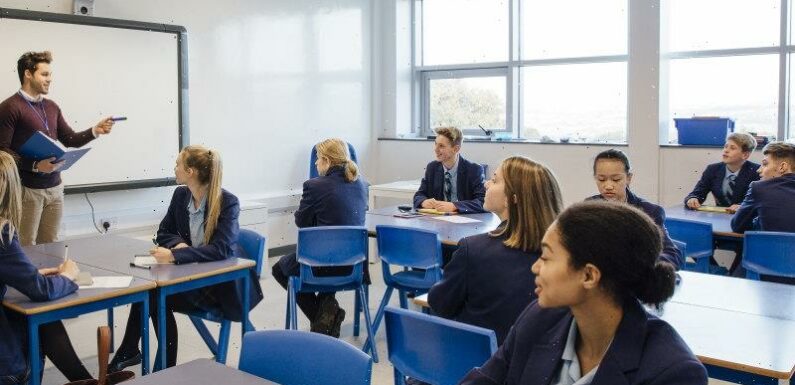
Australian students are being held back by poor teaching practices and lack of direction in the classroom, researchers say.
A major survey of teaching practices by the government-funded Australian Education Research Organisation (AERO) found that managing disruptive behaviour was also a major downfall in Australian teachers’ adoption of the best evidence on teaching practice.
Most teachers use evidence about what works to inform their classroom practice, but there is room for improvement.Credit:iStock
Schools were overly reliant on suspension and expulsion, rather than working towards creating focused classrooms and respectful students, the survey found.
Most Australian teachers did use evidence of what works to inform their teaching practice, but many factors – including a lack of time and confidence – often prevented them from adopting the most effective practice to help students learn, AERO found.
Maximising the use of evidence-based teaching practices was critical to turning around stagnant and declining outcomes in Australian schools, as evidenced by NAPLAN and PISA results, the report argued.
More than 930 teachers and school leaders were surveyed about their teaching practice.
Head of research and evaluation at AERO, Dr Zid Mancenido, said the study provided important insights into the classroom practices of Australian teachers.
“For the first time we can see what is working well and what needs to change about how evidence is being used in Australian schools,” Mancenido said.
He said he hoped the research would drive support for more teachers to effectively use evidence and reverse Australia’s recent declines in student achievement.
“The findings show promise but need to go much further if we are to lift educational outcomes for all students.”
The survey found that 64 per cent of teachers have regular access to instructional coaching on using evidence to improve their teaching, and 73 per cent work at schools that set aside regular times to discuss evidence that could improve their teaching practice.
But it also found that 36 per cent allow unguided instruction or independent inquiry time for students to discover answers for themselves, and 71 per cent design lessons that match the different learning styles of their students.
“These practices are not supported by evidence,” the report found.
The report also surveyed teachers on their classroom management practices, and found that just 61 per cent of teachers frequently tell students to follow classroom rules.
It cited research from the OECD’s latest Teaching and Learning International Survey (2018), which showed that a quarter of Australian teachers need to wait a long time for students to quieten down so that teaching can begin, and a third lose a lot of time because of students interrupting the lesson.
Adam Voigt, chief executive of consultancy Real Schools, said many teachers felt pressured to deliver the content of a large curriculum at the expense of focusing on what students are actually gaining from the lesson.
“There is the kind of pressure that teaching has become a job where what you are trying to do is get through the curriculum so that you can tick off ‘Yes, I taught this’, but it actually isn’t something that engaged the students and got them activated,” Voigt said.
Almost three-quarters of the teachers surveyed said they design lessons that match the different learning styles of their students – a practice that isn’t supported by evidence.Credit:iStock
Many teachers, particularly early career teachers, are looking for robust guidance on how to manage disruptive behaviour, something they are inadequately prepared for in initial teacher education.
“We’ve still got a lot of focus in our pre-service teacher training on the what of teaching, but not the how,” Voigt said.
Dr Jordana Hunter, Grattan Institute program director for education, said keeping up-to-date with research evidence is a big challenge for time-poor teachers: “There needs to be more opportunities for expert teachers, with strong mastery of the research evidence in their subject area, to work with other teachers in their school.”
Hunter said it was disappointing that less than half of surveyed teachers said they would encourage a colleague to stop using a teaching practice that isn’t supported by good evidence.
“Every student deserves best-practice teaching,” she said.
The Morning Edition newsletter is our guide to the day’s most important and interesting stories, analysis and insights. Sign up here.
Most Viewed in National
From our partners
Source: Read Full Article

